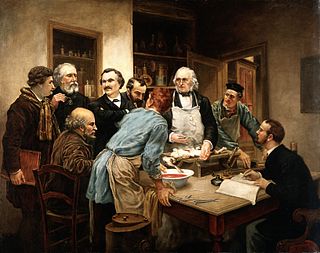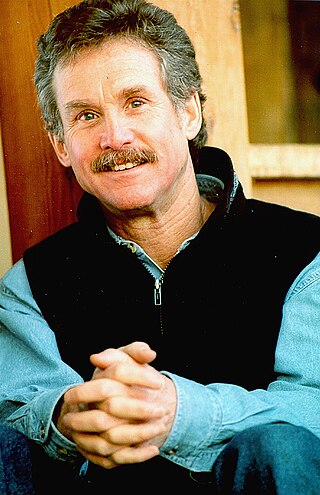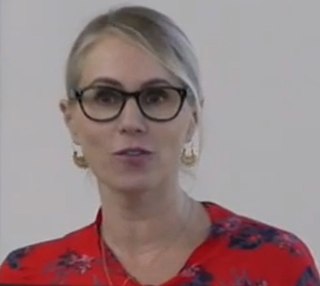Related Research Articles
Involuntary commitment, civil commitment, or involuntary hospitalization/hospitalisation is a legal process through which an individual who is deemed by a qualified person to have symptoms of severe mental disorder is detained in a psychiatric hospital (inpatient) where they can be treated involuntarily. This treatment may involve the administration of psychoactive drugs, including involuntary administration. In many jurisdictions, people diagnosed with mental health disorders can also be forced to undergo treatment while in the community; this is sometimes referred to as outpatient commitment and shares legal processes with commitment.

Physiology is the scientific study of functions and mechanisms in a living system. As a subdiscipline of biology, physiology focuses on how organisms, organ systems, individual organs, cells, and biomolecules carry out chemical and physical functions in a living system. According to the classes of organisms, the field can be divided into medical physiology, animal physiology, plant physiology, cell physiology, and comparative physiology.
Social work is an academic discipline and practice-based profession concerned with meeting the basic needs of individuals, families, groups, communities, and society as a whole to enhance their individual and collective well-being. Social work practice draws from liberal arts, social science, and interdisciplinary areas such as psychology, sociology, health, political science, community development, law, and economics to engage with systems and policies, conduct assessments, develop interventions, and enhance social functioning and responsibility. The ultimate goals of social work include the improvement of people's lives, alleviation of biopsychosocial concerns, empowerment of individuals and communities, and the achievement of social justice.
MindFreedom International is an international coalition of over one hundred grassroots groups and thousands of individual members from fourteen nations. Based in the United States, it was founded in 1990 to advocate against forced medication, medical restraints, and involuntary electroconvulsive therapy. Its stated mission is to protect the rights of people who have been labeled with psychiatric disorders. Membership is open to anyone who supports human rights, including mental health professionals, advocates, activists, and family members. MindFreedom has been recognized by the United Nations Economic and Social Council as a human rights NGO with Consultative Roster Status.

David Quammen is an American writer focusing on science, nature, and travel. He is the author of fifteen books. Quammen's articles have appeared in Outside, National Geographic, Harper's Magazine, Rolling Stone, The New York Times Book Review, The New Yorker, and other periodicals. He is also a science communicator.
Social exclusion or social marginalisation is the social disadvantage and relegation to the fringe of society. It is a term that has been used widely in Europe and was first used in France in the late 20th century. In the EU context, the European Commission defines it as "a situation whereby a person is prevented from contributing to and benefiting from economic and social progress". It is used across disciplines including education, sociology, psychology, healthcare, politics and economics.

Michael I. Posner is an American psychologist who is a researcher in the field of attention, and the editor of numerous cognitive and neuroscience compilations. He is emeritus professor of psychology at the University of Oregon, and an adjunct professor at the Weill Medical College in New York. A Review of General Psychology survey, published in 2002, ranked Posner as the 56th most cited psychologist of the 20th century.
Seymour Jonathan Singer was an American cell biologist and professor of biology, emeritus, at the University of California, San Diego.
William W. Murdoch is a Charles A. Storke II professor of population ecology at the University of California, Santa Barbara. Over the years, his research has focused primarily on the subjects of population regulation, predator–prey dynamics, and biological control. He has also contributed extensively to understanding the scientific and socioeconomic ramifications caused by human overpopulation and environmental degradation. He was the recipient of the 1990 Robert H. MacArthur Award granted by the Ecological Society of America. He is a member of the National Academy of Sciences (NAS), the American Association for the Advancement of Science (AAAS), and the Ecological Society of America (ESA).

The Guatemala syphilis experiments were United States-led human experiments conducted in Guatemala from 1946 to 1948. The experiments were led by physician John Charles Cutler, who also participated in the late stages of the Tuskegee syphilis experiment. Doctors infected 1,300 people, including at least 600 soldiers and people from various impoverished groups with syphilis, gonorrhea, and chancroid, without the informed consent of the subjects. Only 700 of them received treatment. In total, 5,500 people were involved in all research experiments, of whom 83 died by the end of 1953, though it is unknown whether or not the injections were responsible for all these deaths. Serology studies continued through 1953 involving the same vulnerable populations in addition to children from state-run schools, an orphanage, and rural towns. However, the intentional infection of patients ended with the original study.
Janet Currie is a Canadian-American economist and the Henry Putnam Professor of Economics and Public Affairs at Princeton University's School of Public and International Affairs, where she is Co-Director of the Center for Health and Wellbeing. She is the 2024 President of the American Economic Association. She served as the Chair of the Department of Economics at Princeton from 2014–2018. She also served as the first female Chair of the Department of Economics at Columbia University from 2006–2009. Before Columbia, she taught at the University of California, Los Angeles and at the Massachusetts Institute of Technology. She was named one of the top 10 women in economics by the World Economic Forum in July 2015. She was recognized for her mentorship of younger economists with the Carolyn Shaw Bell Award from the American Economics Association in 2015 and also participated in the founding and evaluation of the AEA’s mentoring program for junior faculty.
Warwick Hugh Anderson, medical doctor, poet, and historian, is Janet Dora Hine Professor of Politics, Governance and Ethics in the Discipline of Anthropology, School of Social and Political Sciences, and in the Charles Perkins Centre, University of Sydney, where he was previously an Australian Research Council Laureate Fellow (2012–17). He is also honorary professor in the School of Population and Global Health, University of Melbourne. He is a fellow of the Australian Academy of the Humanities, the Academy of Social Sciences in Australia, the Australian Academy of Health and Medical Sciences and the Royal Society of New South Wales, from which he received the History and Philosophy of Science Medal in 2015. For the 2018–19 academic year, Anderson was the Gough Whitlam and Malcolm Fraser Chair of Australian Studies at Harvard University, based in the History of Science Department.

Katrina Alicia Karkazis is an American anthropologist and bioethicist. She is a professor of Sexuality, Women's and Gender Studies at Amherst College. She was previously the Carol Zicklin Endowed Chair in the Honors Academy at Brooklyn College, City University of New York and a senior research fellow with the Global Health Justice Partnership at Yale University. She has written widely on testosterone, intersex issues, sex verification in sports, treatment practices, policy and lived experiences, and the interface between medicine and society. In 2016, she was jointly awarded a Guggenheim Fellowship with Rebecca Jordan-Young.
Christine Elaine Montross is an American medical doctor and writer. First a published poet and a high school teacher, she later took up medical studies, and became an assistant professor of psychiatry and human behavior at Brown University's Alpert Medical School. She is the recipient of a 2015 Guggenheim Fellowship.
Bruce Prichart Western is an Australian-born American sociologist and a professor of sociology at Columbia University. In 2023, he was elected to the American Philosophical Society.

Elizabeth Thompson Gershoff is Professor of Human Development and Family Sciences at the University of Texas at Austin. She is known for her research on the impact of corporal punishment in the home and at school on children and their mental health.

Alan Charles Evans is a Welsh-born Canadian neuroscientist who is a James McGill Professor of Neurology and Neurosurgery, Psychiatry and Biomedical Engineering, and holds the Victor Dahdaleh Chair in Neurosciences at McGill University. He is also a researcher at the McConnell Brain Imaging Centre of the Montreal Neurological Institute, Co-Director of the Ludmer Centre for Neuroinformatics and Mental Health, Director of the McGill Centre for Integrative Neuroscience, Scientific Director of the Canadian Open Neuroscience Platform, Scientific Director of McGill's Healthy Brains, Healthy Lives program and Principal Investigator of CBRAIN, an initiative aiming to integrate Canadian neuroscience data with the Compute Canada computing network. He is recognized for his research on brain mapping, and was a co-founder of both the International Consortium for Brain Mapping and the Organization for Human Brain Mapping. He was OHBM Chair in 2017-18.
Nicholas Wright Gillham was an American geneticist who served as the James B. Duke Professor of Biology at Duke University. In addition to his scientific research, he is known for his 2001 biography of Francis Galton, A Life of Sir Francis Galton: From African Exploration to the Birth of Eugenics.
Francis Cope Evans was an American ecologist and professor of zoology. He was the president of the Ecological Society of America from 1983 to 1984.

Jianguo Liu is a Chinese American ecologist and sustainability scientist specializing in the human-environment and sustainability studies. He is University Distinguished Professor at Michigan State University.
References
- ↑ "Evans, Gary W., 1948-". Library of Congress Name Authority File. Retrieved 2018-08-17.
- ↑ Dallas, Mary Elizabeth (2017-01-10). "The toll poverty takes on children's mental health". CBS News. Retrieved 2018-08-17.
- ↑ Keim, Brandon (2009-03-30). "Poverty Goes Straight to the Brain". WIRED. Retrieved 2018-08-17.
- ↑ Badger, Emily (2017-05-30). "Does 'Wrong Mind-Set' Cause Poverty or Vice Versa?". The New York Times. Retrieved 2018-08-17.
- ↑ "Gary W. Evans". John Simon Guggenheim Memorial Foundation. Retrieved 2018-08-17.